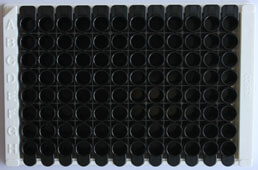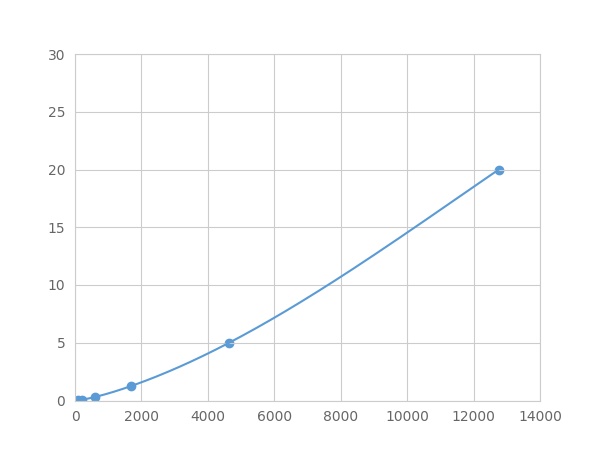Packages (Simulation)

Reagent Preparation

Image (I)
Image (II)
Certificate


Multiplex Assay Kit for Carbonic Anhydrase VI (CA6) ,etc. by FLIA (Flow Luminescence Immunoassay)
CA-VI; CAVI; GUSTIN; Carbonate dehydratase VI; Salivary carbonic anhydrase; Secreted carbonic anhydrase
(Note: Up to 8-plex in one testing reaction)
- Product No.LMD073Hu
- Organism SpeciesHomo sapiens (Human) Same name, Different species.
- Sample TypeSerum, plasma, saliva and other biological fluids
- Test MethodDouble-antibody Sandwich
- Assay Length3.5h
- Detection Range0.02-20ng/mL
- SensitivityThe minimum detectable dose of this kit is typically less than 0.007 ng/mL.
- DownloadInstruction Manual
- UOM 8Plex 7Plex 6Plex 5Plex 4Plex 3Plex 2Plex1Plex
- FOB
US$ 437
US$ 454
US$ 479
US$ 512
US$ 546
US$ 596
US$ 672
US$ 840
Add to Price Calculator
Result
For more details, please contact local distributors!
Specificity
This assay has high sensitivity and excellent specificity for detection of Carbonic Anhydrase VI (CA6) ,etc. by FLIA (Flow Luminescence Immunoassay).
No significant cross-reactivity or interference between Carbonic Anhydrase VI (CA6) ,etc. by FLIA (Flow Luminescence Immunoassay) and analogues was observed.
Recovery
Matrices listed below were spiked with certain level of recombinant Carbonic Anhydrase VI (CA6) ,etc. by FLIA (Flow Luminescence Immunoassay) and the recovery rates were calculated by comparing the measured value to the expected amount of Carbonic Anhydrase VI (CA6) ,etc. by FLIA (Flow Luminescence Immunoassay) in samples.
| Matrix | Recovery range (%) | Average(%) |
| serum(n=5) | 96-104 | 101 |
| EDTA plasma(n=5) | 79-93 | 89 |
| heparin plasma(n=5) | 79-99 | 91 |
Precision
Intra-assay Precision (Precision within an assay): 3 samples with low, middle and high level Carbonic Anhydrase VI (CA6) ,etc. by FLIA (Flow Luminescence Immunoassay) were tested 20 times on one plate, respectively.
Inter-assay Precision (Precision between assays): 3 samples with low, middle and high level Carbonic Anhydrase VI (CA6) ,etc. by FLIA (Flow Luminescence Immunoassay) were tested on 3 different plates, 8 replicates in each plate.
CV(%) = SD/meanX100
Intra-Assay: CV<10%
Inter-Assay: CV<12%
Linearity
The linearity of the kit was assayed by testing samples spiked with appropriate concentration of Carbonic Anhydrase VI (CA6) ,etc. by FLIA (Flow Luminescence Immunoassay) and their serial dilutions. The results were demonstrated by the percentage of calculated concentration to the expected.
| Sample | 1:2 | 1:4 | 1:8 | 1:16 |
| serum(n=5) | 91-101% | 90-102% | 78-96% | 98-105% |
| EDTA plasma(n=5) | 79-101% | 79-101% | 98-105% | 91-98% |
| heparin plasma(n=5) | 79-103% | 97-105% | 84-104% | 84-98% |
Stability
The stability of kit is determined by the loss rate of activity. The loss rate of this kit is less than 5% within the expiration date under appropriate storage condition.
To minimize extra influence on the performance, operation procedures and lab conditions, especially room temperature, air humidity, incubator temperature should be strictly controlled. It is also strongly suggested that the whole assay is performed by the same operator from the beginning to the end.
Reagents and materials provided
| Reagents | Quantity | Reagents | Quantity |
| 96-well plate | 1 | Plate sealer for 96 wells | 4 |
| Pre-Mixed Standard | 2 | Standard Diluent | 1×20mL |
| Pre-Mixed Magnetic beads (22#:CA6) | 1 | Analysis buffer | 1×20mL |
| Pre-Mixed Detection Reagent A | 1×120μL | Assay Diluent A | 1×12mL |
| Detection Reagent B (PE-SA) | 1×120μL | Assay Diluent B | 1×12mL |
| Sheath Fluid | 1×10mL | Wash Buffer (30 × concentrate) | 1×20mL |
| Instruction manual | 1 |
Assay procedure summary
1. Preparation of standards, reagents and samples before the experiment;
2. Add 100μL standard or sample to each well,
add 10μL magnetic beads, and incubate 90min at 37°C on shaker;
3. Remove liquid on magnetic frame, add 100μL prepared Detection Reagent A. Incubate 60min at 37°C on shaker;
4. Wash plate on magnetic frame for three times;
5. Add 100μL prepared Detection Reagent B, and incubate 30 min at 37°C on shaker;
6. Wash plate on magnetic frame for three times;
7. Add 100μL sheath solution, swirl for 2 minutes, read on the machine.
GIVEAWAYS
INCREMENT SERVICES
| Magazine | Citations |
| Metabolomics | Salivary markers of taste sensitivity to oleic acid: a combined proteomics and metabolomics approach Springer: Source |
| American Journal of Immunology | SALIVARY CARBONIC ANHYDRASE VI, ZINC SULFATE TASTE ACUITY AND FREQUENCY OF ILLNESS: A PILOT STUDY Com:Source |
| Physiol Behav. | Associations between food consumption patterns and saliva composition: Specificities of eating difficulties children. pubmed:28185876 |
| Chemical Senses | Differences in the density of fungiform papillae and composition of saliva in patients with taste disorders compared to healthy controls pubmed:28981826 |
| Caries research | Children with a Higher Activity of Carbonic Anhydrase VI in Saliva Are More Likely to Develop Dental Caries. pubmed:28633135 |
| Scientific Reports | Obese Subjects With Specific Gustatory Papillae Microbiota and Salivary Cues Display an Impairment to Sense Lipids Pubmed:29713004 |
| Appetite | Acceptance of added fat to first complementary feeding purees: An exploration of fat type, feeding history and saliva composition Pubmed: 30172680 |
| International journal of molecular sciences | Activity of Carbonic Anhydrase VI is Higher in Dental Biofilm of Children with Caries Pubmed: 31151296 |
| Acta Odontol Scand | Polymorphism in the CAVI gene, salivary properties and dental caries Pubmed: 32013665 |
| Catalog No. | Related products for research use of Homo sapiens (Human) Organism species | Applications (RESEARCH USE ONLY!) |
| RPD073Hu01 | Recombinant Carbonic Anhydrase VI (CA6) | Positive Control; Immunogen; SDS-PAGE; WB. |
| PAD073Hu01 | Polyclonal Antibody to Carbonic Anhydrase VI (CA6) | WB; IHC; ICC; IP. |
| MAD073Hu21 | Monoclonal Antibody to Carbonic Anhydrase VI (CA6) | WB; IHC; ICC; IP. |
| SED073Hu | ELISA Kit for Carbonic Anhydrase VI (CA6) | Enzyme-linked immunosorbent assay for Antigen Detection. |
| LMD073Hu | Multiplex Assay Kit for Carbonic Anhydrase VI (CA6) ,etc. by FLIA (Flow Luminescence Immunoassay) | FLIA Kit for Antigen Detection. |





